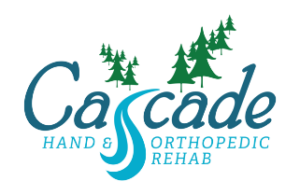
Have you been experiencing pain and discomfort in your arm, elbow, or fingers? Do you get sensations that feel like you just smacked your elbow into a door frame even when you’re completely still? You could have a condition called cubital tunnel syndrome!
The good news is that a skilled hand therapist at Cascade Hand & Orthopedic Rehab in Fort Myers, FL can give you the guidance and care you need to recover and return to leading a normal life that is not hindered by mobility limitations. Give us a call today to learn more!
What is cubital tunnel syndrome?
Cubital tunnel syndrome gets its name from the tunnel in which the nerve travels. When people say they hit their “funny bone,” it is actually the ulnar nerve.
The ulnar nerve is one of the primary nerves in the arm that travels from the neck, along the arm, through the elbow to the fingers. When this nerve is irritated or stretched at the elbow level, a condition called cubital tunnel syndrome can develop.

What causes cubital tunnel syndrome?
Cubital tunnel syndrome can be caused by a variety of factors.
When the elbow is bent for long periods of time, such as when sleeping or holding a phone to the ear, the nerve might stretch. The nerve can shift over the bony section of the inside of the elbow during motion, which could be another explanation. The nerve can also be irritated by direct pressure on the elbow, frequent bending, or severe physical activity of the elbow.
Common symptoms of cubital tunnel syndrome
There are many ways you may have gained the hunch that you have cubital tunnel syndrome!
Pain, numbness, tingling and weakness in the hand are all symptoms of this condition. Numbness, or loss of sensation, is usually felt in the small and ring fingers.
This numbness may gradually turn into pain. Putting pressure on the elbow or bumping it can cause an “electric shock” sensation to the fingers. Other symptoms can include “clumsiness” in the hand, or a claw-like deformity of the ring and small fingers.
What is the treatment of cubital tunnel syndrome?
For nonsurgical treatment, a physician will provide a referral to a hand therapist for education and intervention to help relieve the symptoms. This may include manual therapy techniques, nerve mobilizations, dynamic or Kinesio taping, bracing, and activity modification. If the symptoms do not improve, the physician may recommend a surgery. Surgery involves relieving the pressure on the nerve. Hand therapy is usually recommended following surgery.
How can a hand therapist help with this condition?
Our hand therapist in Fort Myers, FL will assist you in determining which activities aggravate your symptoms and how to reduce them. Exercises for the arm and hand, taping, fitting for a cushioned elbow sleeve, and a custom-made orthosis for night use are all possible treatments.
Therapy will aid in the restoration of normal range of motion and function of the arm and hand if surgery is performed. Your therapist will work daily with you, one-on-one until your pain is lessened and you’re able to manage your symptoms.
Call us today for more information
If you are struggling with cubital tunnel syndrome, there’s no need to keep wincing in pain multiple times a day. Contact Cascade Hand & Orthopedic Rehab for a visit and let’s get you on the road to recovery! Our occupational hand therapists are masters in the field and are looking forward to meeting and treating youin Fort Myers, FL!
Your Next Steps…
Request An Appointment
Receive A Custom Treatment Plan
Work Hard and Progress In Your Recovery
Recover & Enjoy Life Pain-Free!

